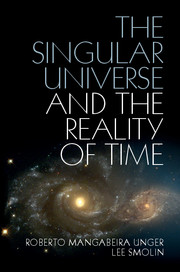Book contents
- Frontmatter
- Contents
- The nature and scope of this work
- Part I Roberto Mangabeira Unger
- 1 The science of the one universe in time
- 2 The context and consequences of the argument
- 3 The singular existence of the universe
- 4 The inclusive reality of time
- 5 The mutability of the laws of nature
- 6 The selective realism of mathematics
- Part II Lee Smolin
- Acknowledgments
- References
- A note concerning disagreements between our views
- Index
2 - The context and consequences of the argument
Published online by Cambridge University Press: 05 December 2014
- Frontmatter
- Contents
- The nature and scope of this work
- Part I Roberto Mangabeira Unger
- 1 The science of the one universe in time
- 2 The context and consequences of the argument
- 3 The singular existence of the universe
- 4 The inclusive reality of time
- 5 The mutability of the laws of nature
- 6 The selective realism of mathematics
- Part II Lee Smolin
- Acknowledgments
- References
- A note concerning disagreements between our views
- Index
Summary
The argument and recent physics and cosmology
The historical context of the argument helps clarify its intentions. Consider four such contexts: the physics and cosmology of the last few decades, the physics of the first half of the twentieth century, the rise of the life sciences and their relation to physics, and the study of human history and society. To place the argument in these multiple contexts is to understand how much is at stake in these disputes. It is also to undermine the fake authority that clings to widespread ideas about the plurality of worlds, the restricted reality of time, and the power of mathematics to serve as a privileged window on reality.
In its relentless quest for a definitive unification – a view that would bring gravity under the same theories that account for the electromagnetic, the strong, and the weak forces – much of contemporary physics and cosmology has despaired of explanations that meet the traditional and exacting standards of either deterministic or probabilistic causality. It has settled for explanations that admit a vast array of states of affairs, of which the observed states of affairs represent no more than particular variations. Rather than acknowledging such underdetermination as a limit or a failure of insight, it has tried to turn a detriment into a benefit by describing the former as the latter.
- Type
- Chapter
- Information
- The Singular Universe and the Reality of TimeA Proposal in Natural Philosophy, pp. 46 - 99Publisher: Cambridge University PressPrint publication year: 2014

